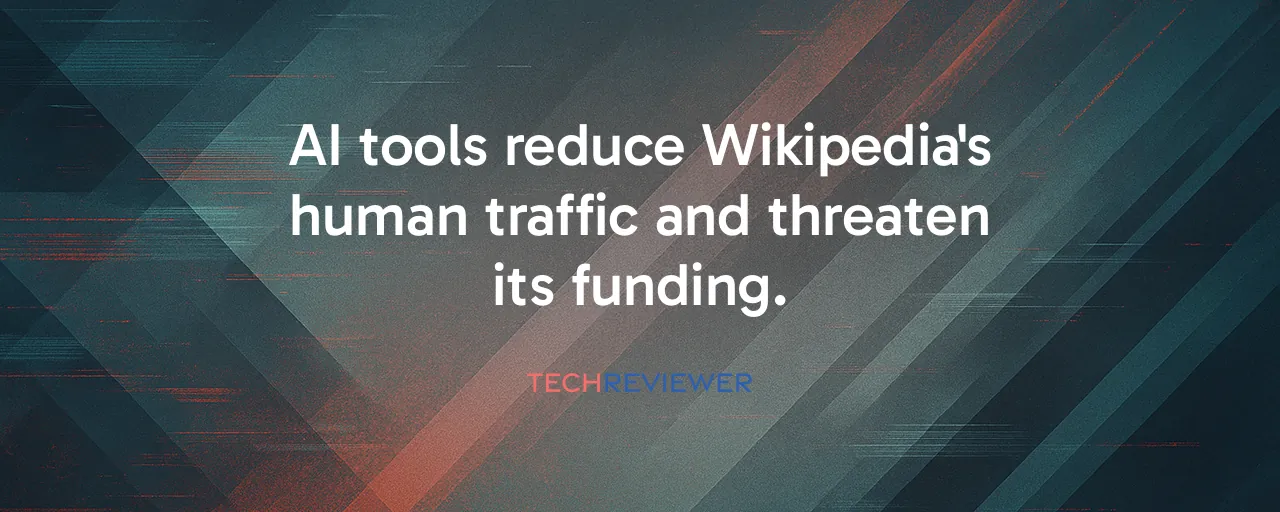A Quiet Crisis for the Knowledge Commons
Wikipedia, the internet's go-to encyclopedia, is facing an unexpected challenge. Human visitors are dropping off, with pageviews down 8% year over year as of October 2025, according to the Wikimedia Foundation. The culprit? Artificial intelligence. Chatbots like ChatGPT and search engine features like Google's AI Overviews are answering questions directly, pulling information from Wikipedia's vast archives without sending users to the site itself. This shift raises tough questions about the future of a platform built on human collaboration and donations.
For years, Wikipedia thrived as a cornerstone of free knowledge, drawing billions of monthly pageviews across 300 languages. Its open model, powered by 260,000 volunteer editors and eight million small donors, seemed unshakable. But AI's rise has changed the game. People now get instant answers from conversational bots or search summaries, bypassing the familiar blue links to Wikipedia articles. The result is a growing disconnect between the platform's content and its audience.
Why AI Is Siphoning Wikipedia's Traffic
The mechanics behind this decline are clear. Large language models, trained on Wikipedia's freely licensed content, deliver polished answers in seconds. Google's AI Overviews, rolled out widely in 2024, summarize Wikipedia entries at the top of search results, cutting click-through rates by 34.5%, according to Ahrefs research. Meanwhile, AI bots are crawling Wikipedia at an unprecedented scale, with a 50% spike in bandwidth use since January 2024, mostly from scraping multimedia for training computer vision models. These bots, often designed to mimic human behavior, even fooled Wikipedia's traffic metrics until updated detection systems revealed the truth in May 2025.
A striking case emerged in Brazil that spring, when a surge in apparent human traffic puzzled the Wikimedia Foundation. After refining bot detection algorithms, they found sophisticated AI crawlers, not people, were behind the spike. This incident underscored a broader trend: AI systems are consuming Wikipedia's resources while diverting human readers elsewhere. For a nonprofit platform, this double hit of higher costs and fewer visitors spells trouble.
The Ripple Effects on Volunteers and Donors
Wikipedia's strength lies in its community. Over 260,000 editors worldwide keep its 64 million articles accurate and up-to-date, driven by the satisfaction of contributing to a global resource. But fewer visitors could dampen that motivation. If people interact with Wikipedia's content through AI intermediaries rather than the site itself, editors may feel their work is less visible, potentially leading to burnout or attrition. Columbia Business School research found that articles most similar to ChatGPT's conversational style saw the steepest traffic drops, suggesting AI is directly competing with Wikipedia's core content.
Funding is another concern. The Wikimedia Foundation relies on small donations, averaging $15 from eight million people, mostly from English-speaking countries. With fewer eyes on Wikipedia's fundraising banners, that revenue stream is at risk. The platform's nonprofit model, unique among top websites, depends on a vibrant cycle of visits, edits, and donations. AI's disruption threatens to break that cycle, forcing Wikipedia to rethink how it sustains itself.
Can Partnerships and Innovation Save the Day?
The Wikimedia Foundation isn't standing still. Its Wikimedia Enterprise service, launched in 2021, offers commercial API access to companies like Google and the Internet Archive, proving that paid partnerships can coexist with free access for individuals. This model could expand, with AI developers like OpenAI or Anthropic potentially licensing Wikipedia's data to support its infrastructure. Such deals could offset the 50% bandwidth surge from AI crawlers while ensuring Wikipedia's content remains a trusted backbone for AI systems.
Another path lies in collaboration. Google's early adoption of Wikimedia Enterprise shows how tech giants can share the load, providing technical or financial support to ease Wikipedia's server costs. Volunteer editors are also adapting, with some proposing tools to detect AI-generated content and policies to maintain quality. On platforms like Reddit, editors have discussed "immune system" responses to protect Wikipedia's integrity, a sign of the community's resilience. These efforts, paired with potential industry standards for AI attribution, could help Wikipedia reclaim its place in the knowledge ecosystem.
Lessons From a Shifting Digital Landscape
Wikipedia's struggle mirrors broader challenges for content creators. Publishers like HuffPost and The Washington Post have seen organic search traffic plummet by over 50% in three years, driven partly by AI-powered search features. SparkToro's 2024 data found that nearly 60% of Google searches end without a click, a trend that's reshaping the web. Wikipedia's case stands out because of its nonprofit mission, but its solutions could inspire others. For instance, Google's partnership with Wikimedia Enterprise offers a blueprint for balancing commercial use with support for open knowledge.
The Brazil traffic incident also highlights a universal problem: distinguishing human from bot activity in an AI-driven world. Wikipedia's investment in better detection systems paid off, but smaller platforms may lack the resources to keep up. These cases suggest that collaboration, whether through licensing deals or shared standards, is critical to sustaining the web's knowledge commons. If Wikipedia can navigate this shift, it might lead the way for others facing the same pressures.
A Future Where Knowledge Thrives
Wikipedia's challenge is a call to action for everyone who values free knowledge. Its transparent, community-driven model offers something AI can't: verifiable, neutral content shaped by thousands of volunteers. But to survive, Wikipedia needs to evolve. Expanding Wikimedia Enterprise, building AI tools to empower editors, and advocating for attribution standards could ensure its longevity. The platform's history of adapting to mobile and search changes proves it can pivot again.
The stakes are high. If Wikipedia fades, the web risks losing a rare nonprofit voice in a sea of commercial platforms. By forging partnerships and embracing innovation, Wikipedia can remain a vital resource, proving that human collaboration and AI can coexist to keep knowledge accessible for all.
